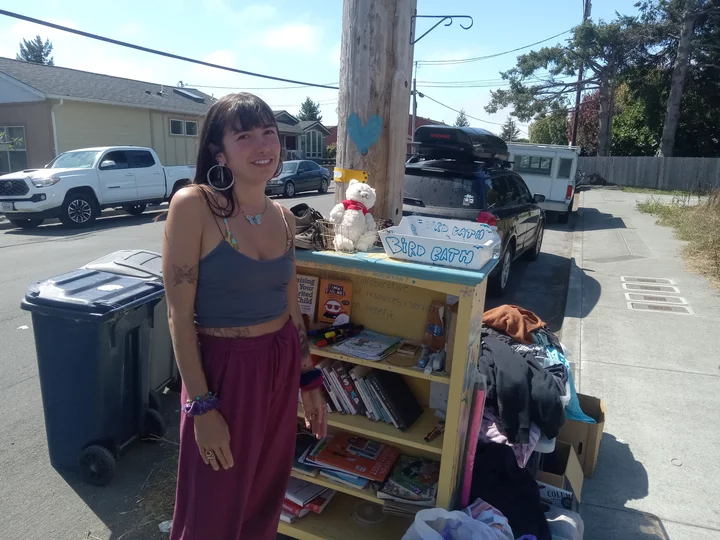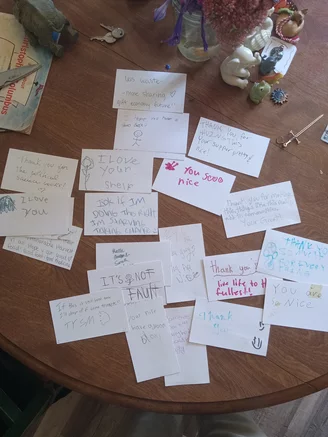Lizzie Rydz and her curated free pile. “I look at it as an altar,” she says. Photo: Dezmond Remington.
Lissie Rydz found a note.
She’d been getting a lot of them on her doorstep since she and her roommates had set up a free pile full of books, clothes, and even spare change out in front of her Arcata house in July — thank you notes, promises to drop off items later, compliments — but this one was negative.
“Please stop putting your free stuff on the sidewalk,” it read. “Put it in your own yard. It attracts trash, makes a mess, and is not o.k. per city of Arcata code. Thank you.”
Rydz was hurt and a little surprised. The free pile, organized on a hand-painted yellow bookshelf, wasn’t what she would call a trash heap. She also didn’t think the shelf’s location on a part of the sidewalk that jutted into the street was a cause for concern either.
“It really hurt,” Rydz said. “I look at it as an altar. I tidy it up every day. I felt watched.”
There’s a longstanding tradition in Arcata of people putting out their unwanted items out in front of their homes, free for the taking. But recently a backlash has started to crop up.
Signs taped to fences and posts on the local social media service Nextdoor rage against the piles. Anti-free pilers cite Arcata municipal code section 5481, which says that building occupants are responsible for removing rubbish that blocks sidewalks or could be bad for property or people.
Many piles aren’t as well-taken care of as Rydz’s. Some are full of waste such as old particle board. Some have been uncurated for too long, exposed to the elements and rotting. One along 27th Street frequently blocks a fire hydrant.
“For some reason, these piles are proliferating these days,” reads one Nextdoor post from an account named “Paula Proctor.” “They make our city look trashy by inviting more junk piles … please be more responsible citizens and have some pride in where we live.”
Proctor declined a request for an interview.
… but not everyone is stoked.
Morguine Sefcik, the environmental programs manager for Arcata’s government, said there has been a noticeable uptick in the amount of complaints they’ve been getting about the free piles since late August.
When the stuff is left on private property and is in good shape, Sefcik said the city likely has no problems with it.
“It’s like a garage sale,” Sefcik said. “Somebody’s managing that garage sale, and when they’re done, they’re going to figure out the next step for their things and manage it. And with free piles, if there was somebody with stuff on their own private property — not on city property — and they were managing this, and it wasn’t getting wet, damp, dispersed, thrown around, trashed, then it could be something that could be okay.”
If items are rotting and piling up, becoming what she called a “garbage issue,” they’ll usually respond with letters and share information about places to donate. If the items are left on public property, it has to be thrown away. All electronic waste, such as cell phones or televisions, has to go all the way to the Eel River Transfer Station in Fortuna. The city doesn’t get a special rate to throw garbage away — all waste disposal is charged at market rate.
Leaving items outside for long amounts of time can also harm the environment. Damp weather breaks things down, turning usable items into trash and microplastics; rain washes it into creeks and into Humboldt Bay.
“It’s also very unsightly,” Sefcik said. “It makes people feel pretty bad to see trash. And if any of these items are blocking streets or sidewalks, it just really affects people’s ability to move around and access their community.”
Arcata’s government prefers that instead of creating free piles, people with things they don’t want any more would donate them to a thrift store or recycle them. Recology customers in single-family homes can get two free bulky item pick-ups a year. The city has started putting out flyers and leaving brochures in areas where the piles often crop up.
Rydz doesn’t see donation as a cure-all. She helps run her free pile specifically to give things away so people don’t have to pay for them. Making people buy the same things they could have picked up for free from the side of the road runs contrary to that mission.
“Things cost money again if they’re donated,” Rydz said. “People say, ‘Oh, just go donate it!’ And then some people can’t afford it.”
Rydz does think there is room for reconciliation between free pile lovers and the haters.
“I hope that people come from a place of curiosity instead of just saying, ‘Oh, why is this stuff appearing?’” Rydz said. “Knock on my door. We can compromise.”



CLICK TO MANAGE